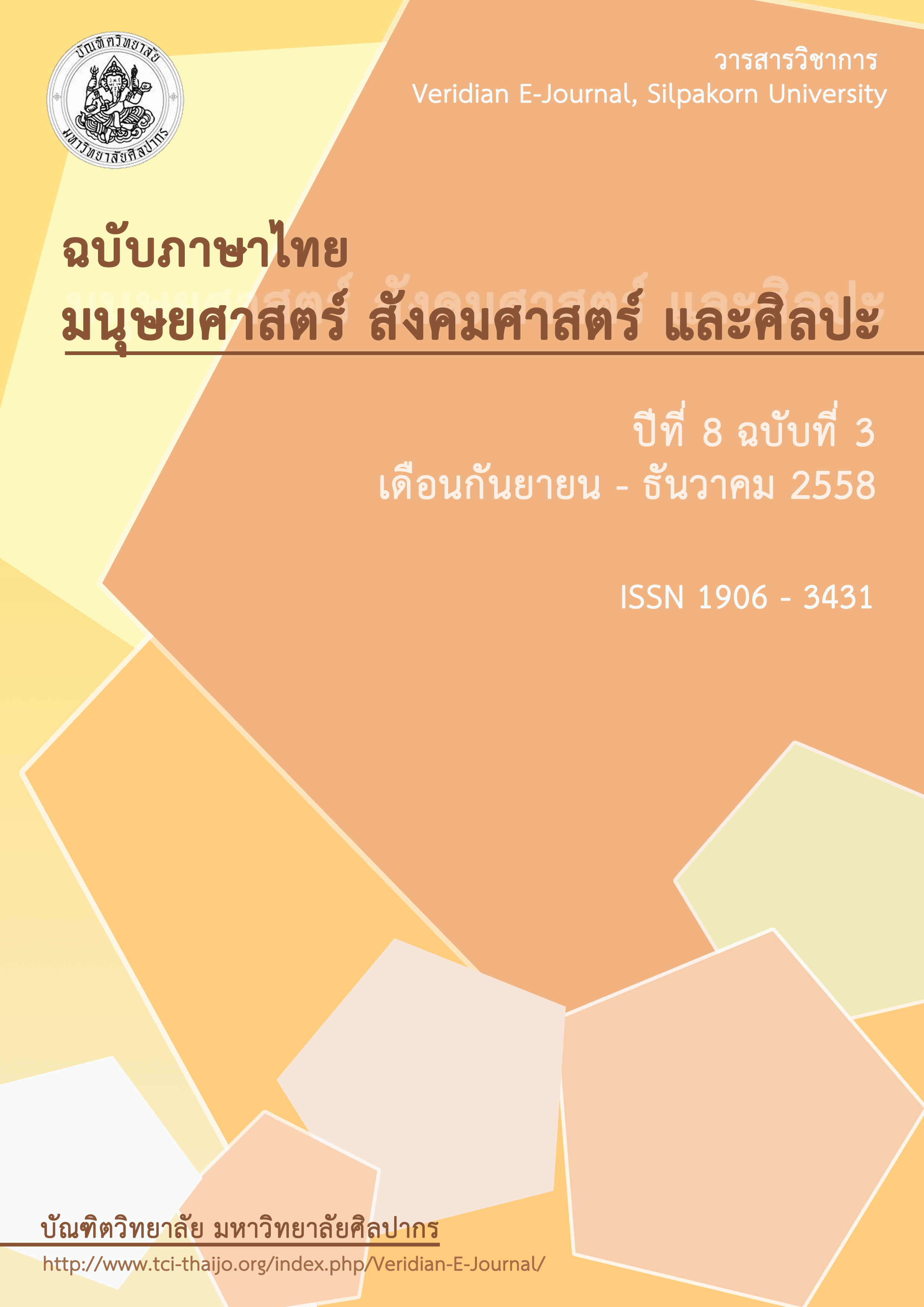พฤติกรรมและผลจากการใช้เครือข่ายทางสังคมออนไลน์ของนักเรียน ระดับชั้นมัธยมศึกษาตอนต้น ในจังหวัดสุโขทัย.
Main Article Content
บทคัดย่อ
บทคัดย่อ
การวิจัยครั้งนี้มีวัตถุประสงค์เพื่อ 1) ศึกษาพฤติกรรมการใช้เครือข่ายทางสังคมออนไลน์ 2) ศึกษาระดับจิตลักษณะ ระดับปัจจัยแวดล้อมและระดับผลกระทบจากการใช้เครือข่ายทางสังคมออนไลน์ 3) เปรียบเทียบระดับผลกระทบจากการใช้เครือข่ายทางสังคมออนไลน์ จำแนกตามปัจจัยส่วนบุคคล 4) ศึกษาปัจจัยที่มีอิทธิพลต่อผลกระทบจากการใช้เครือข่ายทางสังคมออนไลน์ และ 5) ศึกษาแนวทางการแก้ไขผลกระทบจากการใช้เครือข่ายทางสังคมออนไลน์ของนักเรียนระดับชั้นมัธยมศึกษาตอนต้น ในเขตอำเภอเมืองสุโขทัย จังหวัดสุโขทัย เครื่องมือที่ใช้คือแบบสอบถาม แนวทางการสัมภาษณ์เชิงลึก และแนวทางการสนทนากลุ่ม ตัวอย่างในการวิจัยจำนวน 370 คนโดยการสุ่มตัวอย่างแบบง่ายผู้ให้ข้อมูลหลักในการสัมภาษณ์เชิงลึก 15 คนและสนทนากลุ่ม 8 คน โดยเลือกแบบเจาะจง และวิธีการวิเคราะห์ข้อมูลเชิงปริมาณโดยใช้ค่าความถี่ ค่าร้อยละ ค่าเฉลี่ย ค่าส่วนเบี่ยงเบนมาตรฐาน การทดสอบแบบที การวิเคราะห์ความแปรปรวน การวิเคราะห์การถดถอย และการวิเคราะห์เนื้อหา ผลการวิจัยพบว่า 1) นักเรียนส่วนใหญ่มีพฤติกรรมการใช้เครือข่ายทางสังคมออนไลน์ที่บ้านตนเอง เรียนรู้จากเพื่อน มีประสบการณ์การใช้ 1-3 ปี ระยะเวลาแต่ละครั้งนาน 1-2 ชั่วโมง ความถี่ 3-4 ครั้ง/สัปดาห์ ใช้ในช่วงเวลา 18.00 น.- 00.00 น. โดยใช้ในการศึกษาหาความรู้ และใช้พูดคุยกับเพื่อน 2) ระดับปัจจัยจิตลักษณะในภาพรวมอยู่ในระดับมาก ปัจจัยแวดล้อมในภาพรวมอยู่ในระดับปานกลาง และผลกระทบจากการใช้เครือข่ายทางสังคมออนไลน์ในภาพรวมอยู่ในระดับน้อย 3) นักเรียนที่มีปัจจัยส่วนบุคคลด้านครอบครัว การเรียน สุขภาพ และสังคมแตกต่างกันจะมีผลกระทบจากการใช้เครือข่ายทางสังคมออนไลน์แตกต่างกันอย่างมีนัยสำคัญทางสถิติที่ระดับ.05 และปัจจัยแวดล้อมมีอิทธิพลต่อผลกระทบจากการใช้เครือข่ายทางสังคมออนไลน์อย่างมีนัยสำคัญทางสถิติที่ระดับ.05 4) แนวทางการแก้ไขผลกระทบจากการใช้เครือข่ายทางสังคมออนไลน์ ด้านการศึกษา โรงเรียนควรมีมาตรการควบคุมเว็บไซต์ที่ไม่เหมาะสม ด้านครอบครัว ผู้ปกครอง ควรมีการสร้าง กฎการใช้สื่อออนไลน์ ด้านสุขภาพ ควรสร้างพฤติกรรมสุขภาพ ในการใช้เครือข่ายทางสังคมออนไลน์ให้เหมาะสม และด้านสังคม รัฐบาลควรมีนโยบายในการป้องกันปัญหาที่เกิดจากการใช้สื่อออนไลน์
Abstract
This research aimed to 1) study the behaviors in their use of social networks, 2) study the psychological and the environmental traits and the effects of their use of social networks, 3) compare the effects of their use of social networks in relation to personal factors, 4) investigate factors which influenced the effects of their use of social networks, and 5) plan counter mechanisms in response to the problems from their misuse of social networks. The thesis relied on questionnaires, in-depth interviews, and focus group discussions, using 370 samples which had been selected via simple random sampling. There were 15 key informants for the interviews and 8 for the discussions, all of which had been sampled via purposive sampling. In analyzing quantitative data, the thesis used frequency, percentage, mean, standard deviation, T-Test, analysis of variance, regression analysis, and content analysis.
The results of this research were as follows: 1) Most of the students used social networks from their houses, had learned how to use them from friends, had been using them for 1-3 years, used them 3-4 times a week and for 1-2 hours each time, used them from 6 p.m. to 12 a.m., used them for education, and used them with friends. 2) In overall, the psychological traits of the students’ use of the social networks at the high, level the environmental traits at the moderate, level and the effects at the low level. 3) Students with different family, education, health, and social factors were differently affected by the use of social networks by .05 statistical significance, and the influence of the environmental factors on the effects was of .05 statistical significance. 4) counter problems from the misuse of social networks, in areas of education, schools should be equipped with mechanisms against inappropriate online materials. In an aspect of family, parents should not indulge their children with unnecessary technologies and should impose on them essential rules of using online materials. In concern for health, students should be protected against radiation from computer screens. In social perspective, government policies against problems from the misuse of online materials should be made clear.

